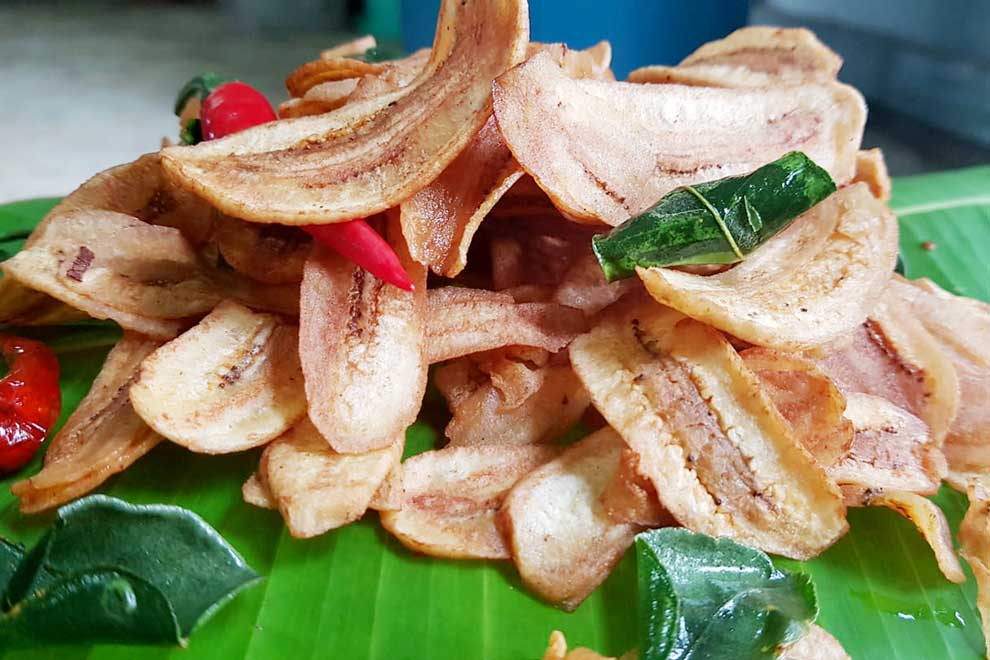
An employee at the Reacheny banana chip workshop deep-fries a batch of freshly sliced Nam Va bananas. Photo supplied
Nun Channy, a former farmer from Battambang province, stared at bunches of leftover bananas in her backyard, wondering how she was going to make ends meet without customers.
Channy lives in rural Samlot district, one of the last Khmer Rouge strongholds and an area where mostly everyone farms for a living.
Not wanting to waste the fruit harvested with her blood and sweat, Channy thought about different ways to use the unwanted fruits.
She says: “I didn’t throw them away or leave them to rot. I suddenly thought of slicing and deep-frying them. The first chips came out so crispy and tasty that I shared them among my relatives and neighbours.”
People complimented Channy on the unique taste and texture of her banana chips and soon came asking for more.
“I never thought that the snack I made to share in the village would become something I could sell. I got so many orders that I couldn’t resist selling these chips.”
In 2017, Channy decided to make banana chips for sale under the name “Reacheny” which means “Queen” in Khmer.
She stopped planting crops and started buying “Nam Va” bananas from other villagers to supply a small workshop she set up in her hometown at Sung commune’s Kanh Chang village in the district.
Her banana chips hobby soon grew into an enterprise with employees.
She hires women who cannot work in the farms for personal or health reasons to perform the whole chip-making process.

Banana chips are common in the Kingdom but Reacheny stands out by offering four different flavours. Photo supplied
Channy says: “Currently, I have eight people working in my small workshop in the district. They’re housewives who handle 150 bunches of bananas daily, which equals around 70kg.
“They are involved in the peeling, slicing, deep frying, weighing and packaging process.”
Not satisfied with her success, she kept tinkering and working to improve her product. Last year, she separated her workshop from her home and upgraded it before tinkering with new flavours.
“I make chips by experimenting with different methods and ingredients. I didn’t stick to what other people usually do,” says Channy.
Reacheny banana chips are now available in four flavours to satisfy the taste buds of locals, foreigners, kids and adults.
“Our banana chips stand out due to our creativity. The regular sweet banana chips are commonplace.
“Many people make them, so we created more recipes. We developed four different tastes to choose from – regular, spicy and sour, salty with Kaffir lime leaves, and sweet,” she says.
The chips, which are now available nationwide in supermarkets, are packaged in either plastic bags or neatly designed paper packages.
The 300g plastic bags sold by vendors cost 7,000 riel ($1.75). The same-sized paper-packaged bags available in supermarkets cost 8,000 riel. Small plastic bags of banana chips sold at schools or for children cost 500 riel.

Owner Nun Channy (not pictured) prefers firm Nam Va bananas grown in Samlot’s mountainous region. Photo supplied
“We make banana chips for profit, but we also prioritise consumers’ health. I kept trying until I got the right recipe which is healthy, natural and tasty. It can last longer than a few weeks without chemicals or preservatives,” she says.
The deliciousness of the chips is a result of Channy’s skill in choosing the right type of fruit based on geography and her carefully managed stages of preparation.
“When you plant Nam Va banana trees in the red soil of Samlot, the plant yields bigger and more fruits. However, the flesh of the banana is spongy, which is not good for making chips.
“In the mountainous area of Samlot, the soil is just right for this banana. The flesh of the banana is firm and perfect for thin slices and crispy chips,” she says.
Channy picks matured but not overripe bananas.
“The regular one produces a simple natural taste. We just deep fry the thin slices without adding anything. The natural quality of the banana fruit itself plays the key role in yielding good taste.
“We need the right level of heat to make the chips crispy and of the right colour. The cooking oil we use just once. We don’t cook with used cooking oil,” she says.
The banana chips are deep-fried twice to create the ideal texture and they can be kept for up to two months in their package. Once they’re opened, they should be consumed within 24 hours.
This year has been a challenge for Reacheny banana chips due to the low levels of rain.

The chips are available nationwide in supermarkets and Channy hopes to export them in the future. Photo supplied
“Actually, banana trees don’t need a lot of water. Just some intermittent rain will make it good for the crops. But this year, it’s dry,” she says.
Channy sourced the fruits from elsewhere and kept producing the chips. She wants them to be available year-round and hopes to export them to the international market.
“Now we only sell the chips in Cambodia, but my dream is that Reacheny banana chips reach market shelves overseas.
“For now, it is an honour that our banana chips have been purchased by people around the country including by the departments of Agriculture; Commerce, and the US embassy with very satisfied feedback,” she says.
Aside from supermarkets and retail stores, Reacheny banana chips can be bought in Phnom Penh at Co-creative coffee (Psar Thmey, Tuol Kork districts), Dumbo coffee (Chamkar Daung district), Tech Cafe (Daun Penh district), Leak Lounge (Daun Penh district) and KOC (BKK, Chroy Changvar districts).
For more information about Reacheny banana chips, contact Channy at [email protected] or call 0966064032 or 017919514.










